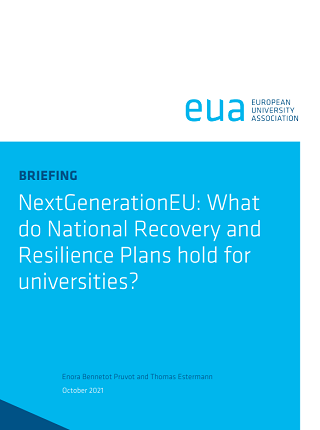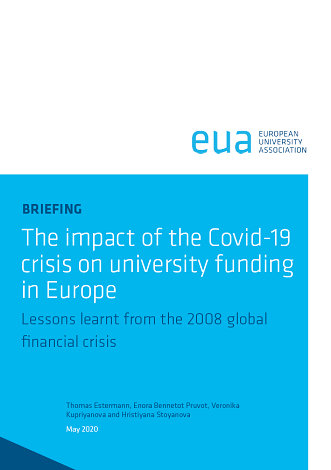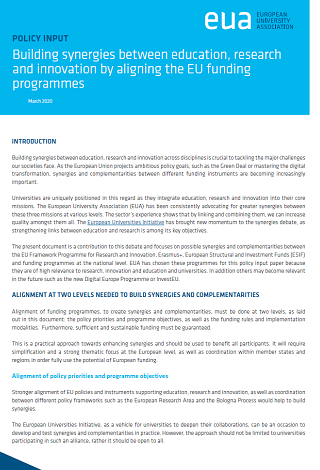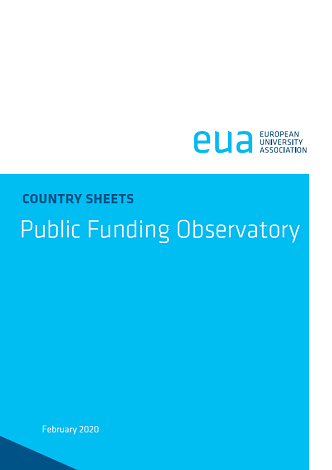Funding
Universities across Europe are facing a challenging and complex financial situation in which traditional modes of funding have been transformed and continue to evolve. EUA’s Public Funding Observatory shows that the economic crisis led many countries to reduce public funding for universities. Despite the recent economic upturn, there is still growing stress on the sustainability of funding and mounting pressure to explore new sources of income. The efficiency of funding in terms of the capability to meet certain policy goals in a cost-effective way is therefore highly important.
EUA closely follows the broad array of policy responses to these challenges. One approach is to link public funding for universities to performance, using proxies for output rather than more traditional input-based funding. Larger-scale system restructuring is also considered to enhance efficiency and international competitiveness. This can be done, for example, by promoting institutional mergers, fostering the differentiation of institutional profiles or creating excellence hubs through specific funding schemes. As a consequence, in many countries in the EU and its Neighbourhood, funding schemes for universities are under revision.
EUA has analysed the related consequences on university funding and governance, in particular the impact such measures have on the institutions themselves, on their teaching and research activities, as well as on their interaction with society and different stakeholders. EUA provides continued support and expertise to institutions and systems in addressing such changes.
-
Public Funding Observatory
EUA keeps a close eye on public funding for Europe’s universities its Public Funding Observatory captures the very latest trends impacting Europe’s universities and offers the most up-to-date information on dozens of different higher education systems across the continent. The data is laid out in a series of reports and an interactive online tool, which is updated annually. The Observatory provides a unique international benchmarking tool and is used by policy makers and sector representatives alike to support the national dialogue on university funding.
The monitoring is conducted in close cooperation with EUA’s collective members, the national rectors’ conferences, which regularly provide extensive funding data on their countries and report on trends developing within their national higher education systems.
-
Funding Forum
The EUA Funding Forum is a biennial European event for university leaders and managers, policy-makers, as well as researchers, to share, learn, grow and improve in strategic governance and funding matters.
Notably, the Funding Forum seeks to:
- look to the future of European funding for universities and their challenges;
- explore new ideas to bring money into higher education;
- help university leaders design adequate strategies in response to funding changes;
- discuss both funder and student perspectives on sustainable funding.
-
Performance-based funding
In a context of constraint and competition for public resources, funding efficiency and accountability of public spending are highly important. Linking public funding to institutional performance is an idea that often features in discussions on university funding policy at both the national and European level. Policy makers often see performance-based funding as a useful tool in connecting funding to measurable indicators. The expected result is more transparency in spending, as well as a clear way to incentivise and reward the achievement of certain policy goals.
Through its work, EUA has revealed that the expectations of performance-based funding are often too high and should therefore be used with caution. On the positive side, it can help increase the transparency of funding allocation and the accountability of public spending as it links funding to measurable indicators and achievements. Performance-based funding might also support profiling and the strategic positioning of universities.
EUA’s “University Efficiency Hub” is an online portal that allows university practitioners and policy makers across Europe to share knowledge and hands-on experience on efficiency, effectiveness and value for money in the field of higher education. It provides information on national frameworks as well as institutional good practices and a self-evaluation tool for universities to move forward in their strategy.
-
Excellence funding
“Excellence funding” refers to public funding schemes whose main objective is to foster excellence. It primarily concerns large-scale initiatives in which public funding is directed to universities on a competitive basis and is focused on the development of wider institutional strategies.
Public authorities may choose to implement such measures for a variety of reasons, including enhancing international visibility, improving the quality of research or teaching, and better matching supply and demand in the higher education market.
However, in a context of constrained resources, excellence schemes are also meant to increase funding efficiency. They often lead to the concentration of funding by creating hierarchies between institutions.
EUA has analysed these schemes and their significant impact both on institutions and on higher education systems in “Designing Strategies for Efficient Funding of Universities in Europe”.
-
Simplification
An overarching objective to achieve better rules for participation in the EU funding programmes is "simplification”. This is an important dimension given its direct impact on universities. EUA has consistently advocated for a more impactful approach to simplification focused on beneficiaries and their specific needs. This approach is mindful of their great diversity and based on high-quality processes and an effective use of resources. In this context, EUA has argued for the wider acceptance of nationally recognised institutional management and accounting practices of beneficiaries as the key implementation principle and the most significant way to enhance efficiency and participation in the EU funding programmes. EUA has collected evidence on how these principles were implemented in 12 countries in a report that explores possibilities for a better alignment of practices between the EU and the national level. In order to achieve this, EUA summarised the data gathered in the compendium in concrete strategic and practical recommendations addressed to EU policy makers.
Other important elements of the Framework Programme implementation supported by EUA’s campaign include a more flexible model grant agreement and more efficient and effective auditing processes. On these matters, EUA relies on its members’ technical expertise shared through EUA consultations and surveys, as well as through a dedicated expert group of university administrators.
EUA has fed this input to the European Commission and the European Court of Auditors in the framework of bilateral exchanges and expert groups, as well as to the European Parliament and the EU Council ahead of the adoption of the legislation establishing Horizon Europe.
-
EU funding for Universities campaign
EUA’s “EU funding for universities” campaign was geared towards attaining improved funding conditions for universities at the European level. The campaign focused on achieving a decision in the EU’s post-2020 Multiannual Financial Framework that is favourable to investment in higher education and research and innovation. EUA was specifically advocating for a higher budget for the 9th Framework Programme (Horizon Europe) and the Erasmus+ programme.
Activities in this campaign focused on two areas:
- critical value of investment in research, education and innovation at the EU and national levels;
- the need to enhance efficiency and effectiveness, notably by implementing impactful simplification.
Positions
-
View more
07 Dec 2023
EUA Research & Innovation Agenda 2027
University R&I, and its synergies with education and service to society, is the premier gateway to the knowledge and skills needed for scientific progress and sustainable societal development.
-
View more
14 Jul 2020
#EUInvestInKnowledge – Call for urgent EU investment in research, innovation and education
As European leaders work towards an agreement on the European Union’s next seven-year budget, the Multiannual Financial Framework, and the related Next Generation EU recovery plan to help the EU’s economy back on its feet, EUA and 14 partner university associations reiterate the urgent need to invest in research, innovation and education to achieve long-term, sustainable recovery and strategic resilience.
Resources
-
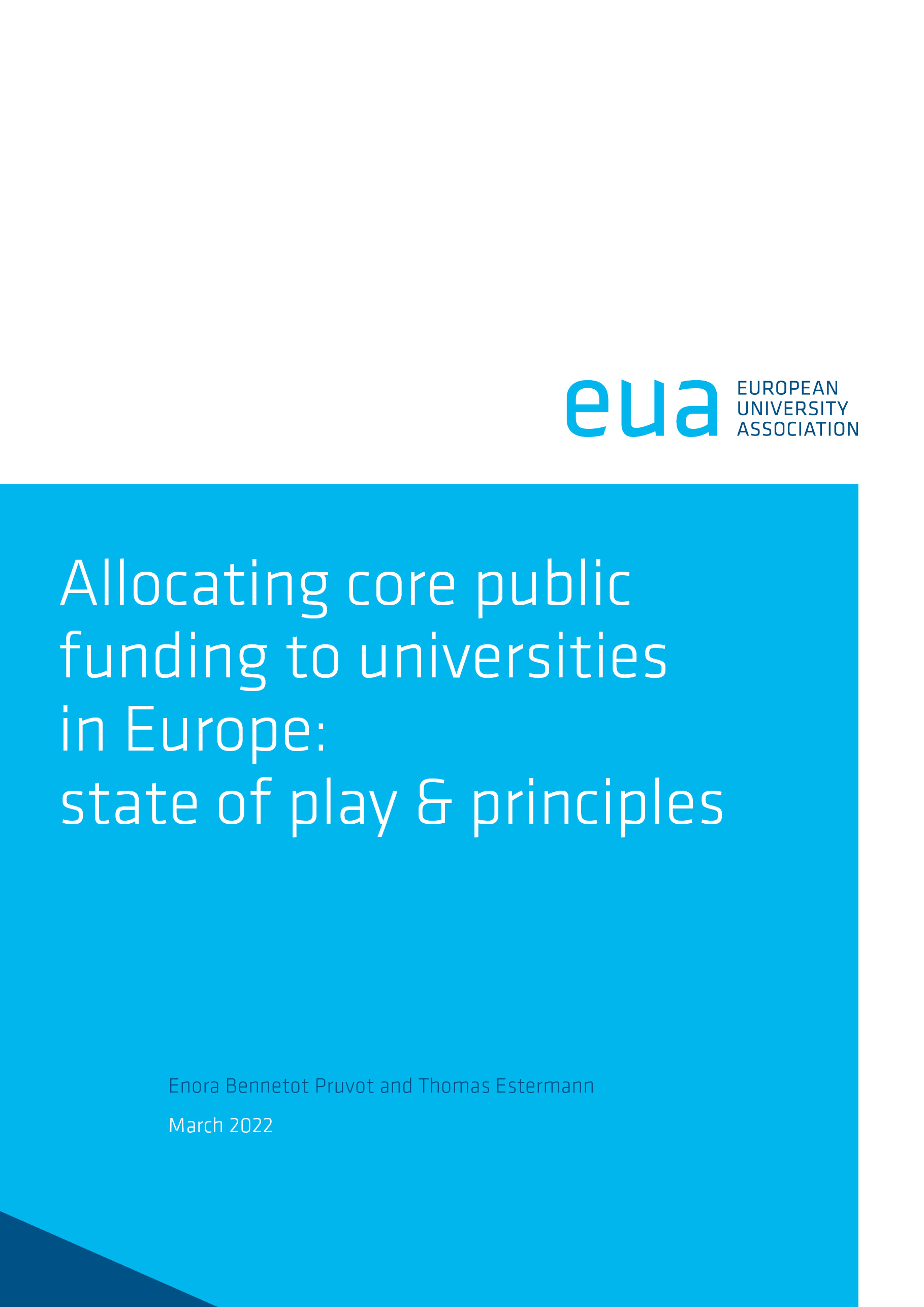
Allocating core public funding to universities in Europe: state of play &...
Report
29 Mar 2022The turbulent economic context of the last decade has been conducive of reforms seeking to enhance...
read more -

Public Funding Observatory 2021/2022
Report
24 Feb 2022This report presents the expectations of national university associations across Europe in terms...
read more -
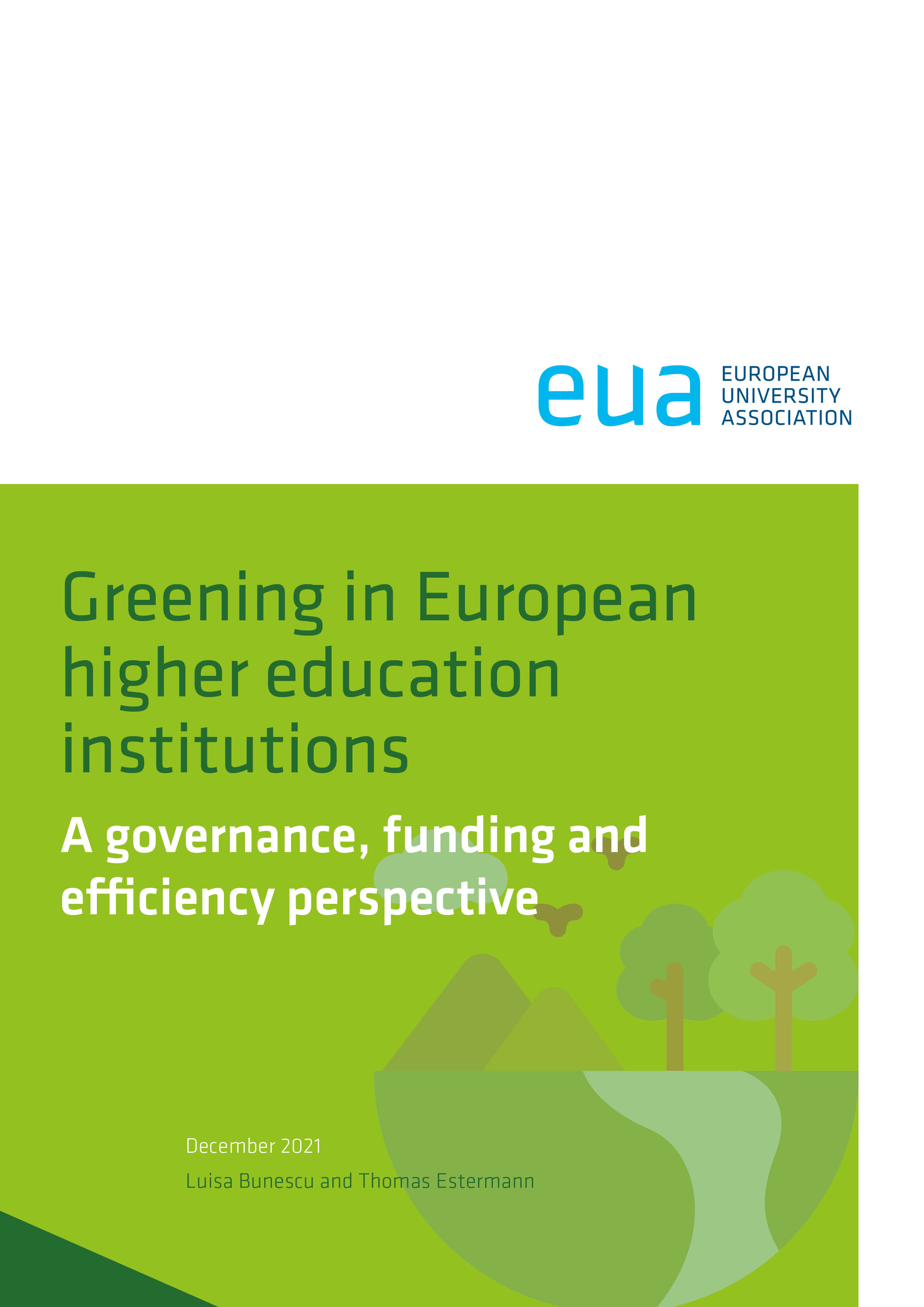
Greening: a governance, funding and efficiency perspective
Policy input
15 Dec 2021Given their education, research and societal missions, universities are important actors in the...
read more -
EUA, CESAER and EARTO call for caution in the use of lump sum funding in...
News
22 Nov 2021EUA, CESAER and EARTO have released a joint statement following the publication of the European Commission’s Assessment of the Lump Sum Pilot 2018 - 2020: Analysis of qualitative and quantitative feedback. This interim analysis concludes that lump sum funding works in practice and can be used...
view more -
Horizon Europe: EUA joins European Parliament in call for a stronger 2022 budget
News
14 Oct 2021In the context of the European Parliament plenary vote on the EU budget for 2022, EUA calls on the Council to revert the proposed cuts and support the full implementation of a future-oriented Horizon Europe. The importance of investing in research has never been clearer than during the...
view more -
NextGenerationEU: What do National Recovery and Resilience Plans hold for...
Briefing
6 Oct 2021Universities have much to say and deliver in the policy areas set forth in NextGenerationEU. They...
read more -
Horizon Europe guidance available to applicants
News
27 Jul 2021Update: the new draft annotated grant agreement was published on 30 November 2021, with changes to articles 1 to 6 and article 20. On 23 July, the European Commission released the long-awaited annotated grant agreement, which provides guidance to Horizon Europe applicants. While the first...
view more -
SDG Watch statement on education for environmental sustainability
News
15 Jul 2021EUA has joined SDG Watch Europe to provide input into the upcoming European Commission proposal for a Council Recommendation on education for environmental sustainability. The Recommendation will look at challenges for the integration of environmental approaches into education at all levels and...
view more -
Horizon Europe Work Programme 2021-2022: funding opportunities for universities
News
21 Jun 2021On 16 June 2021, the European Commission adopted the long-awaited main work programme of Horizon Europe for 2021-2022. It sets out funding opportunities with the total amount of €14.7 billion, most of which will be invested in research and innovation to accelerate the green and digital...
view more -
SAR – Ireland and ALLEA online conference “Academic freedom and intellectual...
Partners news
21 May 2021Scholars at Risk – Ireland and ALLEA, the European Federation of Academies of Sciences and Humanities, organise the online conference “Academic freedom and intellectual dissent” on 8 June, from 15.00 to 20.00 CEST. This conference will focus on the importance of intellectual dissent and...
view more -
European Universities Initiative: EUA warns against top-down steering and...
News
18 May 2021On 17 May 2021, the Education Ministers of EU member states adopted Council Conclusions on the European Universities Initiative. The Council Conclusions come at a crucial point as the mid-term evaluation of the first 17 alliances is approaching and important decisions will soon have to be made...
view more -
Next Generation EU: state of play and funding opportunities for universities
News
20 Apr 2021The university sector must use the window of opportunity provided by the EU recovery plan (Next Generation EU), to present sustainable solutions for campus development and innovation, proposing green and digital institutional transformation projects. As the economic fallout of the Covid-19...
view more -
EUA Public Funding Observatory 2020/2021: country sheets
Report
14 Apr 2021The Public Funding Observatory report 2020/2021, Part 2 is accompanied by individual...
read more -

Public Funding Observatory 2020/2021: part 2
Report
14 Apr 2021This report provides a detailed analysis of long-term funding trends captured over the period from...
read more -
Universities UK's International Higher Education Forum (IHEF) - Online
Partners news
24 Feb 2021On 13-14 April 2021, EUA member Universities UK International will hold their flagship conference, the International Higher Education Forum (IHEF). It will bring together higher education professionals from around the world to engage on topics such as the UK’s exit from the EU,...
view more -
Relief and satisfaction as EU programmes greenlighted to start next year
News
14 Dec 2020After the longest negotiations ever on the seven-year EU budget, member states managed to find a compromise at the European summit on 10 December to overcome the veto of Hungary and Poland. The two countries had contested the mechanism linking the disbursement of EU funds to the respect...
view more -
Perspectives on the new European Research Area from the university sector
Policy input
3 Dec 2020The process to renew the European Research Area (ERA) is gathering pace and is set to continue in...
read more -
Green light for EU seven-year budget: European institutions’ deal tops up...
News
10 Nov 2020The European Parliament and EU Council negotiating team finally agreed on the EU’s multiannual financial framework, a process made more complex than ever this time due to the pandemic and the related new recovery package, the difficulties of striking a deal among member states, and the strongly...
view more -
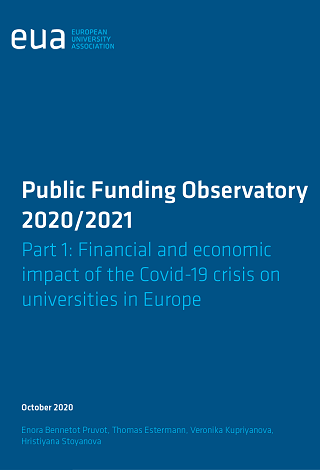
Public Funding Observatory 2020/2021: part 1
Report
22 Oct 2020This report provides a detailed picture of the immediate impact of the Covid-19 pandemic on...
read more -
HRK, UNIKO and VSNU unite in call for EU investment in education, research and...
News
22 Oct 2020The presidents of the German Rectors’ Conference (HRK), Universities Austria (UNIKO) and the Association of Universities in the Netherlands (VSNU), all EUA members, have published a common statement urging governments to recognise the value of education, research and innovation in the EU...
view more -
Knowledge must be at the heart of plans to revitalise Europe
News
17 Sep 2020The European University Association’s response to Ursula von der Leyen’s State of the Union speech Under President Ursula von der Leyen, the European Commission has set an ambitious agenda for Europe, for the green and digital transitions of the continent and for Europe’s role in the world. These...
view more -
EUA welcomes European Parliament resolution calling for more future-oriented...
News
23 Jul 2020The European Parliament met on 23 July in an extraordinary plenary session to adopt a resolution declaring that it does not accept the budget deal made by EU leaders on 21 July. EUA welcomes the resolution and supports the European Parliament in its call for more funding for research, innovation...
view more -
EU leaders cut research and innovation to reach deal
News
21 Jul 2020On 21 July, EU leaders agreed on the next EU seven-year budget and the associated recovery plan after a long and difficult summit spanning over four days. The outcome reveals a failure to invest strategically in the future, with curtailed ambitions towards research, innovation and...
view more -
University associations unite to urge EU policy makers to invest in education,...
News
14 Jul 2020European leaders meet this week on 17-18 July with the goal of reaching an agreement on the European Union’s next seven-year budget and the related recovery plan to help the EU’s economy back on its feet. On this occasion, EUA and 14 partner university associations reiterate the urgent need to...
view more -
European Universities Initiative: 24 new alliances selected
News
10 Jul 2020On 9 July, the European Commission announced the selection results of the second pilot call under the European Universities Initiative. Out of 62 applications, 24 new university alliances were chosen with a total of 165 participating higher education institutions from 26 countries. 122 of those...
view more -
Erasmus+: Europe’s future depends on ambitious commitment to education and...
News
26 Jun 2020In the European Commission’s latest proposal for the EU’s next seven-year budget, Erasmus+ is projected to be funded with 24.6 billion euros. While this would represent an increase of 3.4 billion compared to the 2014-2020 programme, EUA has expressed concern in a statement that the amount will not...
view more -
KEPA organises the 13th International Conference on Energy and Climate Change
Partners news
17 Jun 2020The Energy Policy and Development Centre (KEPA) of the National and Kapodistrian University of Athens in Greece organises the 13th International Conference on Energy and Climate Change on 7-9 October 2020, with the 7th Green Energy Investments Forum taking place on the first day. Last year, the...
view more -
EU seven-year budget proposal falls short of urgently needed education and R&I...
News
27 May 2020As the European Commission released its new proposal for the next seven-year budget of the European Union, the academic community nourished hope that, in the few past months, it had become clear to policymakers just how fundamental adequate investment in research, innovation and education is to...
view more -
Exploring higher education indicators
Report
25 May 2020There is a legitimate need for data on the performance of higher education institutions. It is...
read more -
The impact of the Covid-19 crisis on university funding in Europe
Briefing
18 May 2020In the context of the coronavirus pandemic, and its expected economic impact, this EUA briefing...
read more -
EU R&I Framework Programmes’ petition on Horizon Europe personnel costs
Partners news
11 May 2020EU Research & Innovation Framework Programmes’ (FPs) beneficiaries, including universities, research and technology organisations and businesses, launched a petition urging the European Institutions to take into consideration the major concerns raised by the proposed Horizon Europe Model Grant...
view more -
#Erasmus500: Towards a truly European grant
Partners news
7 May 2020The European Students Union (ESU), the Erasmus Student Network (ESN) and the European University Foundation (EUF) are launching a proposal for a baseline mobility grant of 500€/month from 2021 onwards. The #Erasmus500 Declaration builds upon a DAAD proposal from 2019 and is aimed at addressing...
view more -
International strategic institutional partnerships and the European...
Video
30 Apr 2020 view more -
The future of the European Universities Initiative: EUA publishes position and...
News
27 Apr 2020EUA has published the position “The future of the European Universities Initiative – the sector’s perspective” together with the results of the recent EUA survey on international strategic institutional partnerships and the European Universities Initiative. Endorsed by the EUA Council, the...
view more -
International strategic institutional partnerships and the European...
Report
27 Apr 2020In early 2020, EUA conducted a survey on international strategic institutional partnerships and...
read more -
Friends of the ERC’s petition to protect independent research in the EU budget
Partners news
23 Apr 2020Friends of the ERC, an initiative in support of the European Research Council (ERC), launched a petition to call upon the Heads of States and Governments, to secure funding for the ERC in Horizon Europe, the next European framework programme for Research and Innovation. The petition is...
view more -
Building synergies between education, research and innovation by aligning the...
Policy input
9 Mar 2020Building synergies between education, research and innovation across disciplines is crucial to...
read more -
EUA Public Funding Observatory 2019/20 - Country sheets
Report
20 Feb 2020The Public Funding Observatory report 2019/20 is accompanied by individual country...
read more -
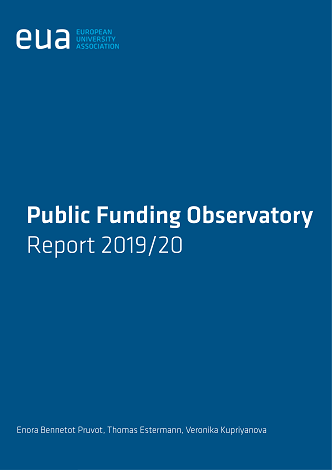
EUA Public Funding Observatory Report 2019/20
Report
20 Feb 2020The Public Funding Observatory Report 2019/20 offers the most up-to-date information on 34 higher...
read more -
Special EU summit: EUA calls for ambitious funding for Horizon Europe and...
News
17 Feb 2020European Council President Charles Michel called a special European Summit on 20 February to discuss the Multiannual Financial Framework. The negotiations of this seven-year budget are down to the wire and will determine the future of key programmes like Horizon Europe and Erasmus+. EUA...
view more -
Initiative for Science in Europe launches petition for more investment in...
Partners news
14 Feb 2020A petition from the Initiative for Science in Europe (ISE) calls on member states to invest more in education, research, and innovation. ISE asks supporters to sign the petition and spread the word within Europe’s research community. The campaign comes as negotiations on the EU’s next...
view more -
Next EU seven-year budget: member states’ math does not add up
News
11 Dec 2019In an important new step towards a final decision on the European Union’s financial framework for 2021-2027, the Finnish presidency of the EU Council released its proposal for the bloc’s future budget. Referred to as a “negotiating box”, the proposal includes figures for the overall budget as well...
view more -
EUA calls for efficient and flexible implementation of Horizon Europe
News
2 Dec 2019EUA has issued a statement on the future Model Grant Agreement that is under preparation as part of the Horizon Europe implementation process. To ensure major simplification and to mitigate the risk of errors, the Association is calling for a new Model Grant Agreement that builds on a broader...
view more -
Horizon Europe implementation: EUA calls for an efficient and flexible Model...
Policy input
2 Dec 2019As negotiations continue on the future Horizon Europe programme, the discussion on the Model Grant...
read more -
Seize our common future: latest on long-term EU budget negotiations
News
21 Nov 2019In November, EUA published the joint call “Seize our common future”, which it launched with 14 other university networks. The call gathered over 300 signatories, including 25 national university associations. EUA presented the call to both to the outgoing and incoming EU Commissioners for...
view more -
Council of the EU: joint meeting of finance and education ministers
News
20 Nov 2019On 8 November, the first ever joint meeting of member state education and finance ministers at EU level took place in Brussels. Discussions circled around the contribution of education and training to long-term sustainable growth and policies strengthening the efficiency and effectiveness of...
view more -
EUA President meets with next EU Commissioner for Innovation and Youth
News
17 Oct 2019Mariya Gabriel, Commissioner-designate for Innovation and Youth, was well-received during her official hearing in the European Parliament on 30 September. As the College of Commissioners awaits final approval, Gabriel has already begun meetings with key stakeholders. This week she sat down with...
view more -
Horizon Europe: EUA presents “Seize our common future” call to European...
News
1 Oct 2019EUA Vice President Paul Boyle represented Europe’s universities at the European R&I Days in Brussels on 24-26 September 2019, speaking on behalf of 800+ EUA members and fourteen partner associations. During an official ceremony, he presented the European Commission with the call “Seize our...
view more -
EUA calls on the European Parliament to defend EU investment in R&I in 2020
News
19 Sep 2019Update 19/11/2019 On 18 November, the EU Council and the European Parliament reached an agreement on the EU budget for 2020. The deal includes more funds for Horizon 2020, successfully reinforcing the programme with an increased focus on climate research. There will be this 13.46bn Euros...
view more -
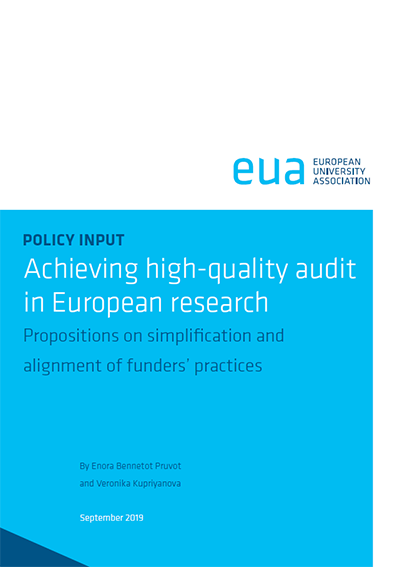
Achieving high-quality audit in European research
Policy input
29 Aug 2019This briefing outlines EUA’s proposals to national and EU funders on how to make the EU...
read more -
Achieving high quality audit in European research
News
29 Aug 2019As the new academic year kicks in, Brussels is getting ready for the “European Research & Innovation Days”, dubbed as “the first annual policy event of the European Commission, bringing together stakeholders to debate and shape the future research and innovation...
view more -
Seize our Common Future: Join the call for an ambitious Horizon Europe budget
News
24 Jul 2019EUA and 14 other associations, along with a growing number of 200+ signatories, are calling for an ambitious European budget for research, education and innovation. The call urges EU leaders to put put in place an ambitious Horizon Europe budget that would invest in excellent, cross-border...
view more -
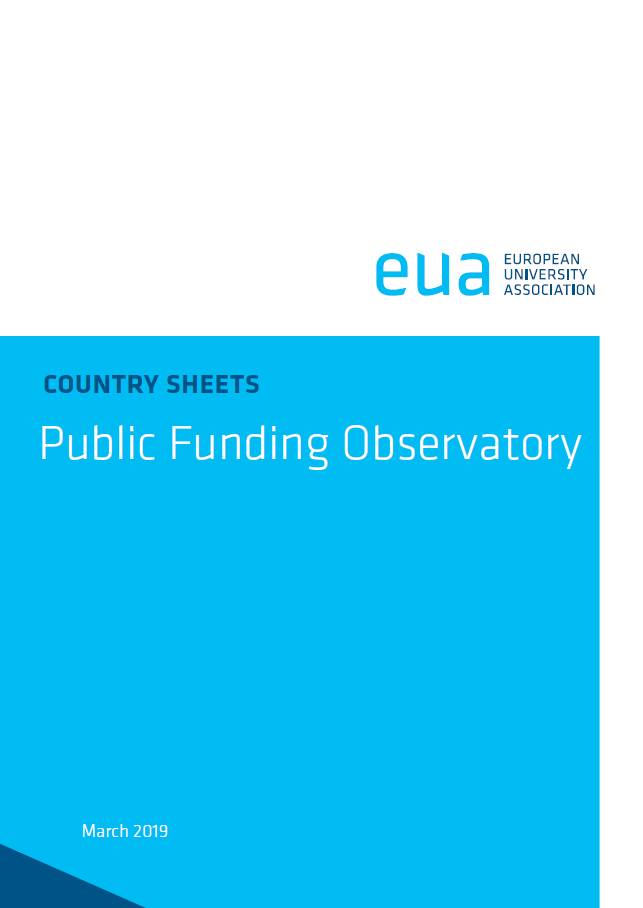
EUA Public Funding Observatory 2018 - Country sheets
Report
21 Mar 2019The 2018 Public Funding Observatory report comes with individual country sheets. They offer an...
read more -

EUA Public Funding Observatory Report 2018
Report
21 Mar 2019The Public Funding Observatory Report 2018 offers the most up-to-date information on 33 different...
read more -

EUA presents latest data on university funding
News
20 Mar 2019EUA has launched the latest edition of its Public Funding Observatory, which offers information on...
view more -

A comparative analysis of public procurement frameworks and practices in...
Report
21 Dec 2018A substantial share of public investment is spent on public procurement in the European Union and...
read more -
A strategic approach to change for university leaders
News
13 Dec 2018During the course of this year EUA has been focusing on the capacity of university leaders to initiate and carry out strategic transformation programmes in a series of activities. Indeed, many universities across Europe are developing such programmes, that either seek a step change in...
view more -

4th EUA Funding Forum Plenary session – Funding trends in Europe
Video
18 Oct 2018 view more -
EUA Funding Forum underway in Barcelona
News
18 Oct 2018The 4th EUA Funding Forum is taking place at Ramon Llull University in Barcelona, Spain. Under the theme “Frameworks that empower, universities that deliver”, the event focuses on the capacity of universities to deliver on their missions in an efficient way. A high-level panel of...
view more -
EUA launches University Efficiency Hub
News
18 Oct 2018EUA’s “University Efficiency Hub” is now online. Launched at the 4th EUA Funding Forum, the portal allows university practitioners and policy makers across Europe to share knowledge and hands-on experience in efficiency, effectiveness and value for money in the field of higher...
view more -
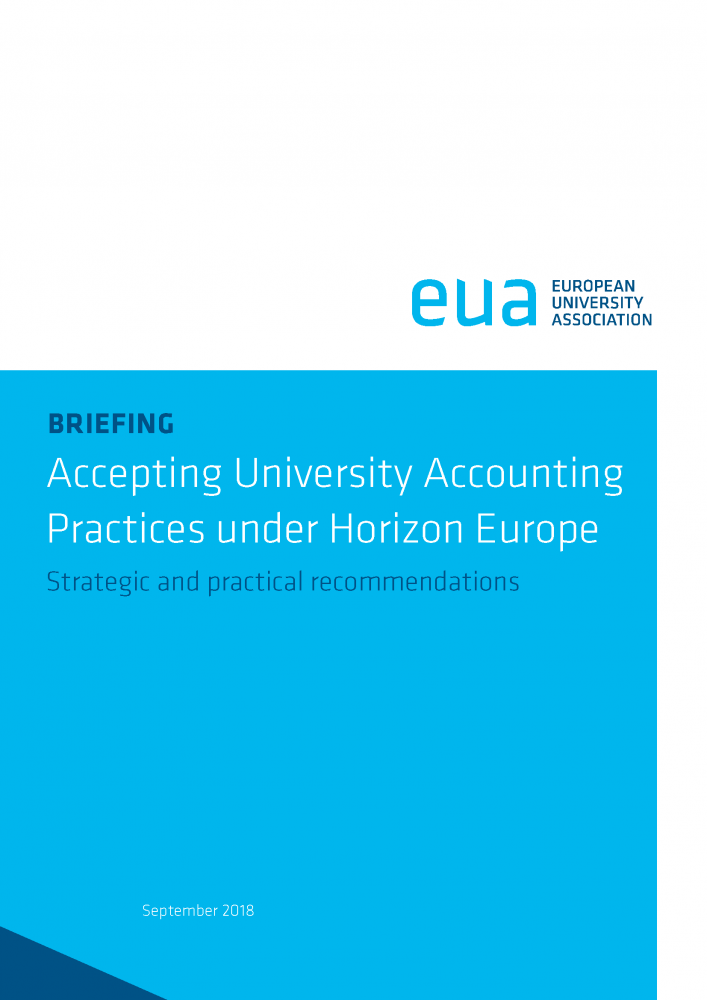
Accepting University Accounting Practices under Horizon Europe - Strategic and...
Briefing
20 Sep 2018As negotiations move forward in hammering out the design of Horizon Europe, this EUA briefing...
read more -
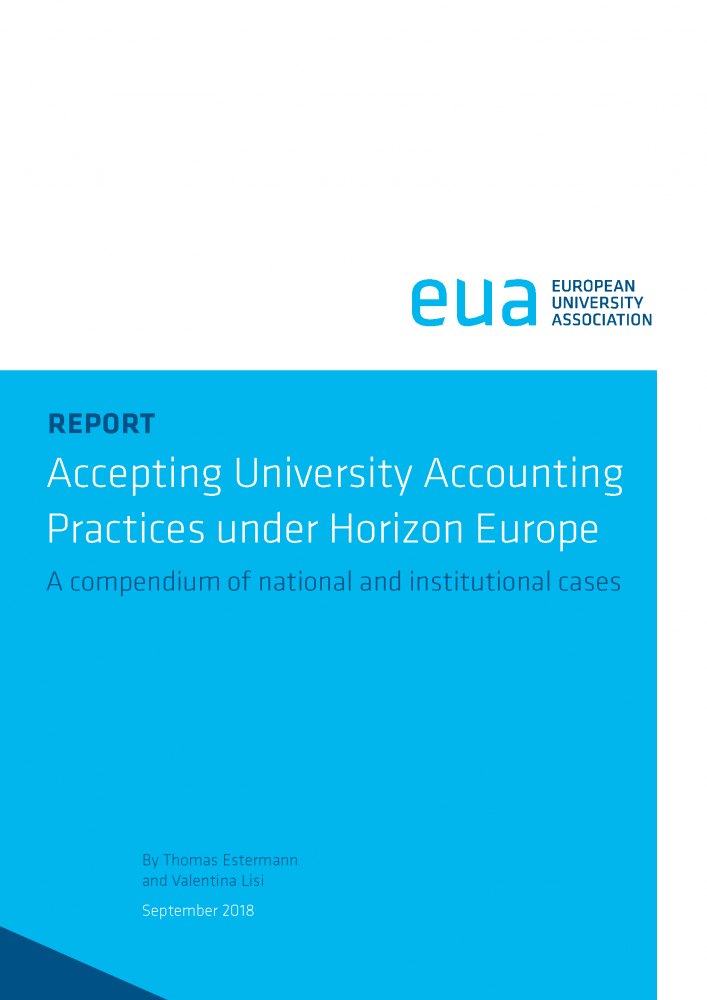
Accepting University Accounting Practices under Horizon Europe - A compendium...
Report
20 Sep 2018Ahead of the adoption of the European Commission’s proposal for Horizon Europe, university...
read more -
University practitioners provide concrete recommendations for a simpler...
News
20 Sep 2018The road towards Horizon Europe reached a new milestone in September with discussions in the European Parliament on possible amendments to the Commission’s proposals (see the series of amendments put forward by EUA and 12 other university associations). As the Committee for...
view more -
EUA webinar: 2017 Public Funding Observatory
Video
24 Jul 2018 view more -
Funding Forum 2018: Speakers preview
News
5 Jul 2018The university community will meet in Barcelona on 18-19 October to discuss the latest trends in funding and governance. The full programme, with confirmed speakers, has now been released. The “Leaders’ panel”, which will explore ways for university leaders to “steer through the storm”,...
view more -
Governance, funding and mergers top the agenda of three USTREAM national...
News
5 Jul 2018The USTREAM project has successfully completed a series of three national policy dialogue events, organised jointly with local partners in May-June 2018. Each event was tailored to the specific needs of and the current developments in the higher education sector in three host countries – Latvia,...
view more -
4th Funding Forum – Frederic Forest, Ministère de l’Enseignement Supérieur,...
Video
2 Jun 2018 view more -
4th Funding Forum – Sebastiao Feyo de Azevedo, University of Porto, Portugal
Video
1 Jun 2018 view more -
4th Funding Forum – Liviu Matei, Central European University, Budapest, Hungary
Video
1 Jun 2018 view more -
4th Funding Forum – Frederic Forest, Ministry for Higher Education, Research...
Video
1 Jun 2018 view more -
4th Funding Forum – Esa Hämäläinen, University of Helsinki, Finland
Video
1 Jun 2018 view more -
4th Funding Forum – Cristina Messa, Rector of the University of...
Video
1 Jun 2018 view more -
4th Funding Forum – Josep Garrell, Ramon Llul University, Barcelona, Spain
Video
1 Jun 2018 view more -

EUA Member Consultation 2017-2018: Impactful Simplification of the EU...
Report
29 May 2018In 2016, EUA launched the EUA Member Consultation on the Horizon 2020 Mid-Term Review,...
read more -

EU long-term budget proposal takes the right direction, but does not take the...
Policy input
2 May 2018The European University Association (EUA) appreciates the European Commission’s proposal for the...
read more
Expert voices
-
Universities, the energy crisis and the cost-cutting trap [Op-ed]
13 Dec 2022With multi-fold increases in energy bills being felt across Europe, is this one crisis too many...
read more -
Public funding of universities in Europe: challenges and tensions
21 Apr 2022Higher education systems across Europe currently use a variety of funding instruments, with...
read more -
NextGenerationEU: making the most of opportunities for universities
13 Oct 2021What does NextGenerationEU mean for the university sector? Funding expert Enora Bennetot Pruvot...
read more -
University funding in France today and tomorrow
13 Sep 2021With the rapid growth of the student body, the need to refurbish university real estate and the...
read more -
The green transition at universities: public procurement as a powerful tool
8 Jul 2021Higher education institutions in Europe are highly engaged in addressing environmental challenges...
read more -
A change of pace for research and education funding in Italy
7 Jul 2021With billions of euros on the table, Next Generation EU could be a game changer for research and...
read more -
EU recovery funds - a window of opportunity for universities
14 Apr 2021The EU recovery plan offers an immediate chance to invest in education and research as we approach...
read more -
2020: the year of European virtual mobility?
25 Jun 2020In the coming academic year, virtual mobility might be the only reliable option for some...
read more -
Universities initiative can thrive with the right support
12 May 2020Confinement due to the coronavirus is a great challenge for the international mobility of...
read more -
Universities beyond the coronavirus crisis – what awaits?
7 May 2020EUA President Michael Murphy assesses the challenges and opportunities brought by the coronavirus...
read more -
University funding amid the coronavirus pandemic: lessons learnt from the 2008 global economic crisis
23 Apr 2020As the coronavirus pandemic impacts the global economy, funding for universities is bound to take...
read more -
Grant allocation and gender disparity: identifying the bias factors
6 Mar 2020Grants are important for researchers’ careers and only the best applicants receive them. So, what...
read more -
Viewpoint: Europe cannot afford to back-pedal on research and education
20 Feb 2020Finding a compromise on the EU’s next budget is no doubt a highly complex task. But after the lean...
read more -
Four steps to keep the EU’s heart pumping via knowledge and science
24 Sep 2019The new European Commission must make research, education and innovation a priority as it sets out...
read more -
Fundraising: Much more than money is at stake for universities
7 Jan 2019More than ever before, universities in Europe are becoming interested in fundraising. Christian...
read more -
Leading universities in financially challenging times
6 Dec 2018Leading a university can become very difficult when finances are strapped and difficult decisions...
read more -
The Triple E: Efficiency, Effectiveness and “Economisation”: Moving beyond carrot and stick
4 Dec 2018When universities come under financial fire, ideas flourish on how to be more efficient and...
read more -
Irish universities launch special charter and campaign to save their spark
7 Nov 2018Ireland’s universities have joined forces to transform capacity and performance in order to...
read more -
Finding opportunities in the push for efficiency
18 Oct 2018Thomas Estermann from the European University Association examines the university efficiency...
read more
Projects
-
USTREAM
Universities for Strategic, Efficient and Autonomous Management USTREAM sought to examine the measures that are in place in universities across Europe to enhance...
-
Public Funding Observatory
Keeping a close eye on public funding for Europe’s universities EUA’s Public Funding Observatory captures the very latest trends impacting Europe’s universities...
-
DEFINE
Designing Strategies for Efficient Funding of Higher Education in Europe Higher education institutions across Europe face today a demanding and complex financial context... -
ATHENA
Fostering Sustainable and Autonomous Higher Education Systems in the Eastern Neighbouring Area The ATHENA project contributed to the development, reform and modernisation of higher education...
Events
-
This year, EUA brings the university community together online to discuss funding in an event scheduled on 21-22 September 2020. The sessions addressed the...
Read more -
12.30-15.00 CEST The USTREAM partners are organising the final project event for European and national policy makers and university leaders to present the...
Read more -
© La Salle-URL
The 2018 EUA Funding Forum focused on discussion and exchange of experiences among university leaders and managers and policy-makers. Keep yourself...
Read more -
© U.Porto Rectory
For the third time, universities, public authorities and partners came together to take stock of and discuss the latest funding trends, opportunities and...
Read more
